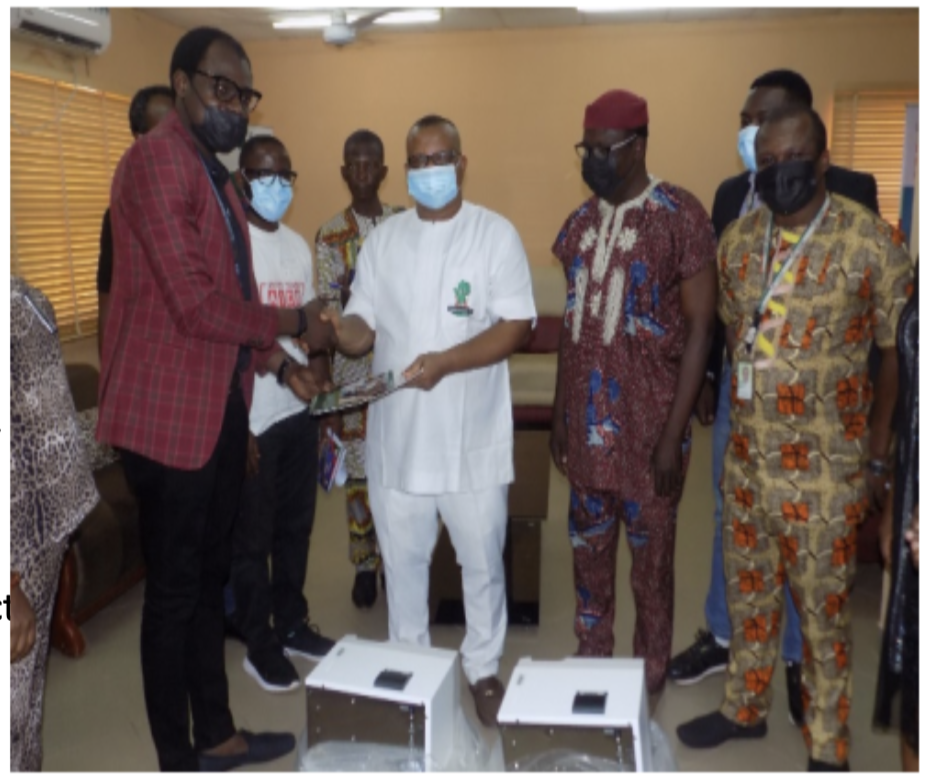As part of stakeholders’ collaborative process, the Excellence Community Education Welfare Scheme (ECEWS) through the Global Fund National Aligned HIV/AIDS Initiative Project with FHI 360 as the principal recipient in Ebonyi State donated 2 Abacus 380 Hematology Analyzers to the Ebonyi State Government. The equipment is a flagship product of Diatron’s 3-part differential hematology analyzers with a high performance of 22 parameters, reliable and easy to use. The NAHI Project Technical Director (Representing the Project Director) presented the equipment, and they were received by the Hon. Commissioner for Health, on behalf of the Ebonyi State Government. This donation was necessitated by the withdrawal of GF support for chemistry and Hematology parameters in HIV service. The implication is that the Ebonyi state Government will take the responsibility for the installation, training of personnel as well as maintenance and support for reagent procurement for the 2 equipment.

Capacity strengthening of HIV Counsellor Tester to improve quality of HIV Testing Services (HTS)
The Global Fund NAHI is focusing on capacity strengthening of HIV Counsellor Testers to improve quality of HIV Testing Services (HTS) to prevent giving out false negative or false positive HIV test results.
This involved re-training of Community ART Management (CAM) team Counsellor Testers, Adolescent Girls and Young Women AGYW Counsellor Testers, Prevention of Mother-To-Child (PMTCT) Specific Counsellor Testers, mentor mothers who test at Traditional Birth Assistance (TBA) setting as well as Counsellor Testers at the various supported health facilities. Aside, improving HIV case finding via quality HIV Testing Services (HTS), another area of focus was capacity strengthening technical backstops, Case Manager generalists and tracking volunteers on how to prevent leakages from the Treatment Current (TCS 1) in the NAHI grant. The activities involved technical review meetings and on-site mentorship on appointment reminders, tracking imminent Lost to Follow Up (LTFU) as well bringing back People Living with HIV (PLHIVs) already LTFU. Monthly capacity building for Sexual Network Testing (SNT) Case Managers was also conducted to strengthen their capacity on quality and efficient partner elicitation that would give the desired positivity yield from index case testing (ICT).

AGYW intervention outreaches were also conducted. Various secondary schools, beauty salons, other technical and tailoring schools were reached with minimum prevention packages out of which those up to age of consent received HIV testing. PMTCT Support Group Meetings and AYP support group meetings were held in the period under review, with focus on improving the quality of care provided to positive pregnant women and adolescent clients in care.
The Prevention Care and Treatment intervention continued to strengthen the identification, care and treatment of PLHIVs across the general and key populations along the UNAID 95-95-95 goal while strengthening collaborative efforts with all relevant National and State level Stakeholders and Partners.
Regional National Integrated Specimen Referral Network (NISRN) stakeholders’ meetings
To ensure continuous implementation of quality management system and quality improvement process at the Polymerase Chain Reaction (PCR) Lab services and maintenance of reduced turnaround time at the PCR Labs, GHSC-PSM, the managers of the National Integrated Sample Referral Network, NISRN conducted quarterly regional meetings to which they invited staff of the 3 GF supported PCR Labs located within the regions. The HQ Lab team facilitated and supported the PCR Lab staff to attend the quarterly NISRN meetings during the period. The meetings provided opportunity to resolve issues with samples transportation and managements from sending facilities and results pick up at the PCR Lab as at when due.
Participation at National HIV&AIDS Spectrum Estimates Workshop
HIV/AIDS estimates are produced by the HIV/AIDS division of the Federal Ministry of Health in collaboration with NACA, UN organization and other relevant stakeholders annually. The process includes generating estimates for all the states in Nigeria and FCT. Estimates are used for advocacy, planning and impact assessment at all levels (sub-national, national, and global). The 2021 data, a major input in the estimate generation was recently disseminated to stakeholders, and the next step in the reporting cycle is to generate the National estimates using the spectrum software. This meeting held between March 28 – April 1, 2022. The exercise was instrumental to the attainment of the plan for the “100% reporting from LAMIS initiative.



